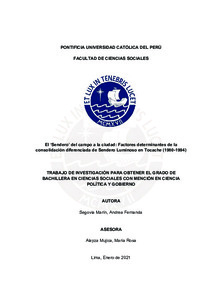| dc.contributor.advisor | Alayza Mujica, María Rosa | |
| dc.contributor.author | Segovia Marín, Andrea Fernanda | |
| dc.date.accessioned | 2022-10-08T06:51:32Z | |
| dc.date.available | 2022-10-08T06:51:32Z | |
| dc.date.created | 2021 | |
| dc.date.issued | 2022-10-08 | |
| dc.identifier.uri | http://hdl.handle.net/20.500.12404/23493 | |
| dc.description.abstract | Durante el Conflicto Armado Interno peruano, el actor insurgente más relevante,
Partido Comunista del Perú Sendero Luminoso, logró su consolidación más
profunda y prolongada en la región de Alto Huallaga. Sin embargo, 20 años
después del conflicto, aún no se conoce qué factores permitieron que la
organización establezca estructuras de gobernanza en la zona, ni cuál fue la
naturaleza de éstas. El caso de la provincia de Tocache demuestra que existe
una variación entre aquellas formas de gobernanza que se ejercieron: mientras
en el campo el control era mucho más profundo, gobernando aspectos de la vida
privada de los civiles; en las zonas urbanas las reglas impuestas se limitaban a
la provisión de seguridad y el cobro de impuestos. La investigación propone que
esta variación se debe a la convergencia de tres variables. En primer lugar está
la ausencia de instituciones estatales legítimas en ambas zonas; por el contrario,
se encuentra que, existían instituciones sociales fuertes en las zonas urbanas
que previnieron un control total de la vida cotidiana; finalmente, se encuentra que
la cadena de valor de la coca genera mayores beneficios económicos en zonas
urbanas, promoviendo la indisciplina dentro de la organización insurgente, y por
lo tanto, la flexibilidad las reglas que se aplican.
De esa manera, el presente trabajo resalta la relevancia de la interacción de
factores institucionales y los recursos naturales disponibles para determinar la
profundidad en la consolidación de actores insurgentes en escenarios de
conflicto armado. | es_ES |
| dc.description.abstract | During the Peruvian Internal Armed Conflict, the most relevant insurgent actor,
the Communist Party of Peru Sendero Luminoso, achieved its deepest and most
prolonged consolidation in the Alto Huallaga region. However, 20 years after the
conflict, it is still not known what factors allowed the organization to establish
governance structures in the area, or what the nature of these structures was.
The case of the province of Tocache shows that there is a variation between
those forms of governance that were created: while in the countryside the control
was much deeper, governing aspects of the private life of civilians; in urban areas
the rules imposed were limited to the provision of security and the collection of
taxes. Our research proposes that this variation is due to the convergence of
three variables. First, the absence of legitimate state institutions in both areas;
on the contrary, it is found that there were strong social institutions in urban areas
that prevented a total control of daily life; finally, it is found that the coca value
chain generates greater economic benefits in urban areas, promoting indiscipline
within the insurgent organization, and therefore, flexibility in the rules that are
enforced.
In this way, this work highlights the relevance of the interaction of institutional
factors and the natural resources available to determine the depth in the
consolidation of insurgent actors in scenarios of armed conflict. | es_ES |
| dc.language.iso | spa | es_ES |
| dc.publisher | Pontificia Universidad Católica del Perú | es_ES |
| dc.rights | info:eu-repo/semantics/openAccess | es_ES |
| dc.rights.uri | http://creativecommons.org/licenses/by-sa/2.5/pe/ | * |
| dc.subject | Terrorismo--Perú--Tocache (San Martín : Provincia) | es_ES |
| dc.subject | Sendero Luminoso | es_ES |
| dc.subject | Coca--Perú | es_ES |
| dc.title | El ‘Sendero’ del campo a la ciudad: Factores determinantes de la consolidación diferenciada de Sendero Luminoso en Tocache (1980-1994) | es_ES |
| dc.type | info:eu-repo/semantics/bachelorThesis | es_ES |
| thesis.degree.name | Bachiller en Ciencias Sociales con mención en Ciencia Política y Gobierno | es_ES |
| thesis.degree.level | Bachillerato | es_ES |
| thesis.degree.grantor | Pontificia Universidad Católica del Perú. Facultad de Ciencias Sociales | es_ES |
| thesis.degree.discipline | Ciencias Sociales con mención en Ciencia Política y Gobierno | es_ES |
| renati.advisor.dni | 07814726 | |
| renati.advisor.orcid | https://orcid.org/0000-0002-6721-931X | es_ES |
| renati.author.dni | 70365352 | |
| renati.discipline | 312026 | es_ES |
| renati.level | https://purl.org/pe-repo/renati/level#bachiller | es_ES |
| renati.type | https://purl.org/pe-repo/renati/type#trabajoDeInvestigacion | es_ES |
| dc.publisher.country | PE | es_ES |
| dc.subject.ocde | https://purl.org/pe-repo/ocde/ford#5.06.00 | es_ES |






